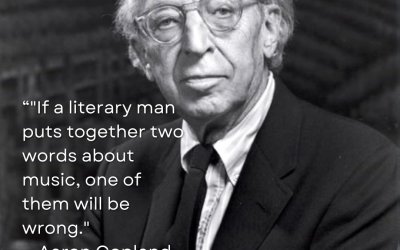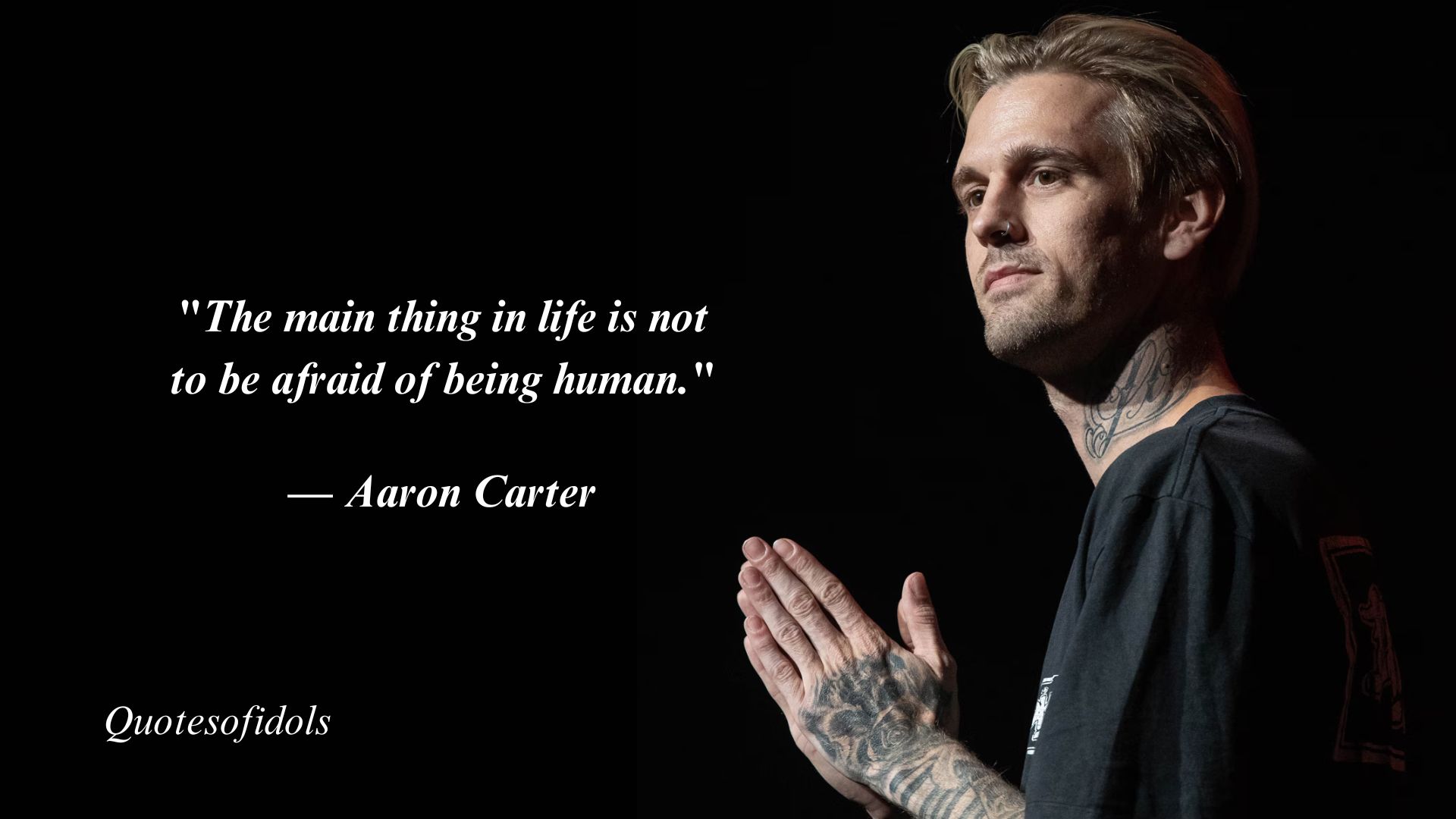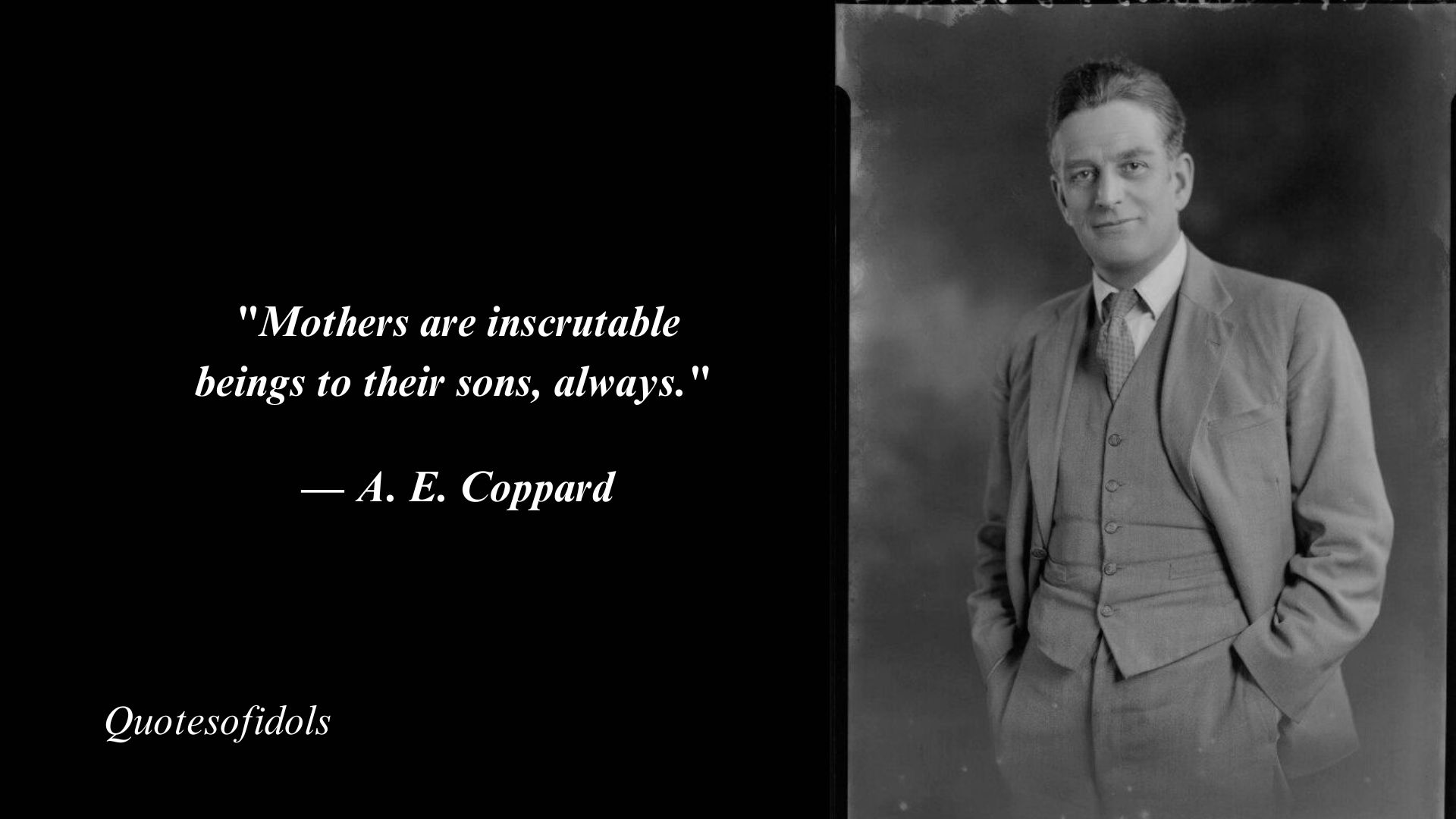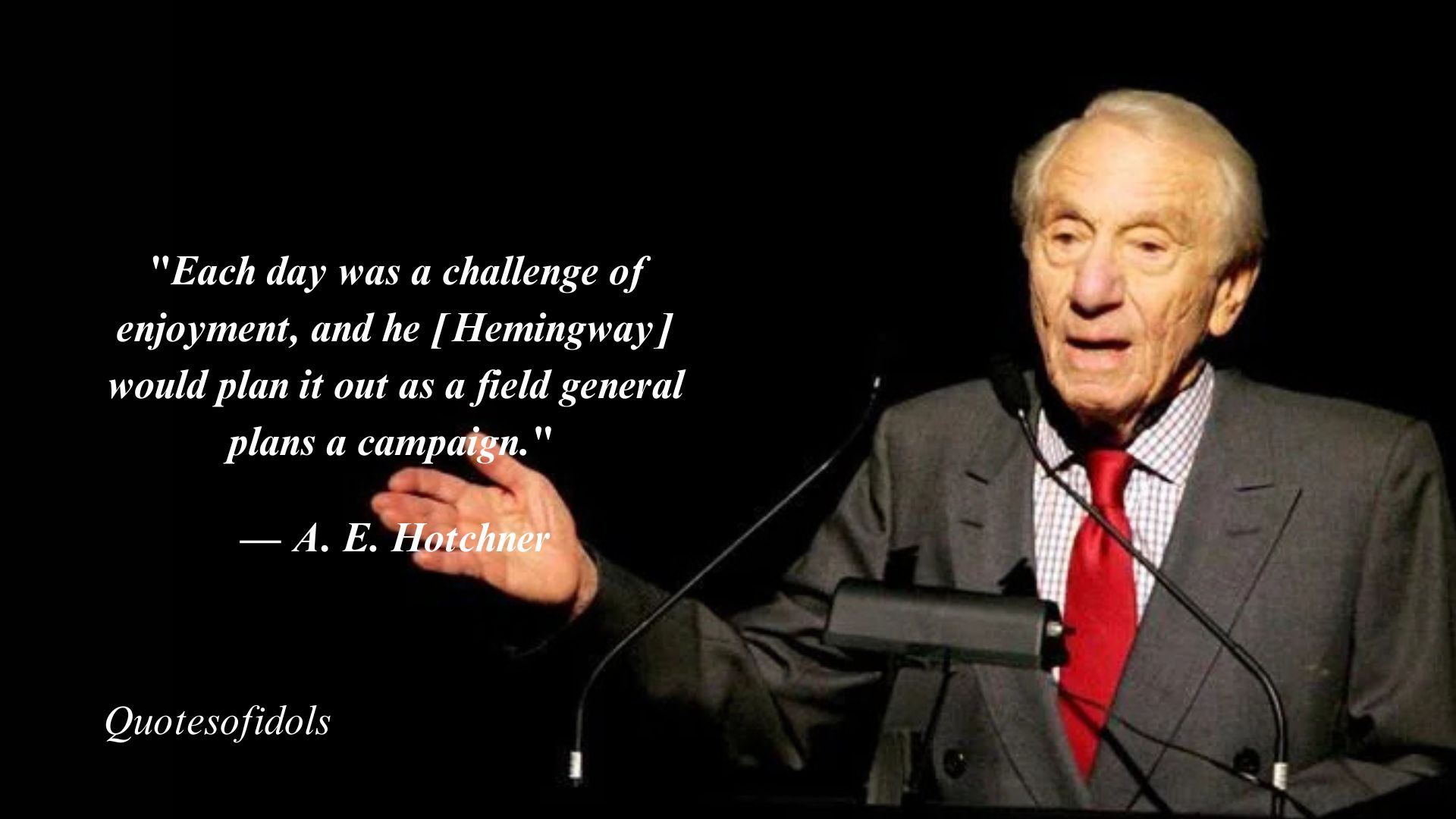Marcel Proust Quotes: Timeless Insights on Life, Love, and Art
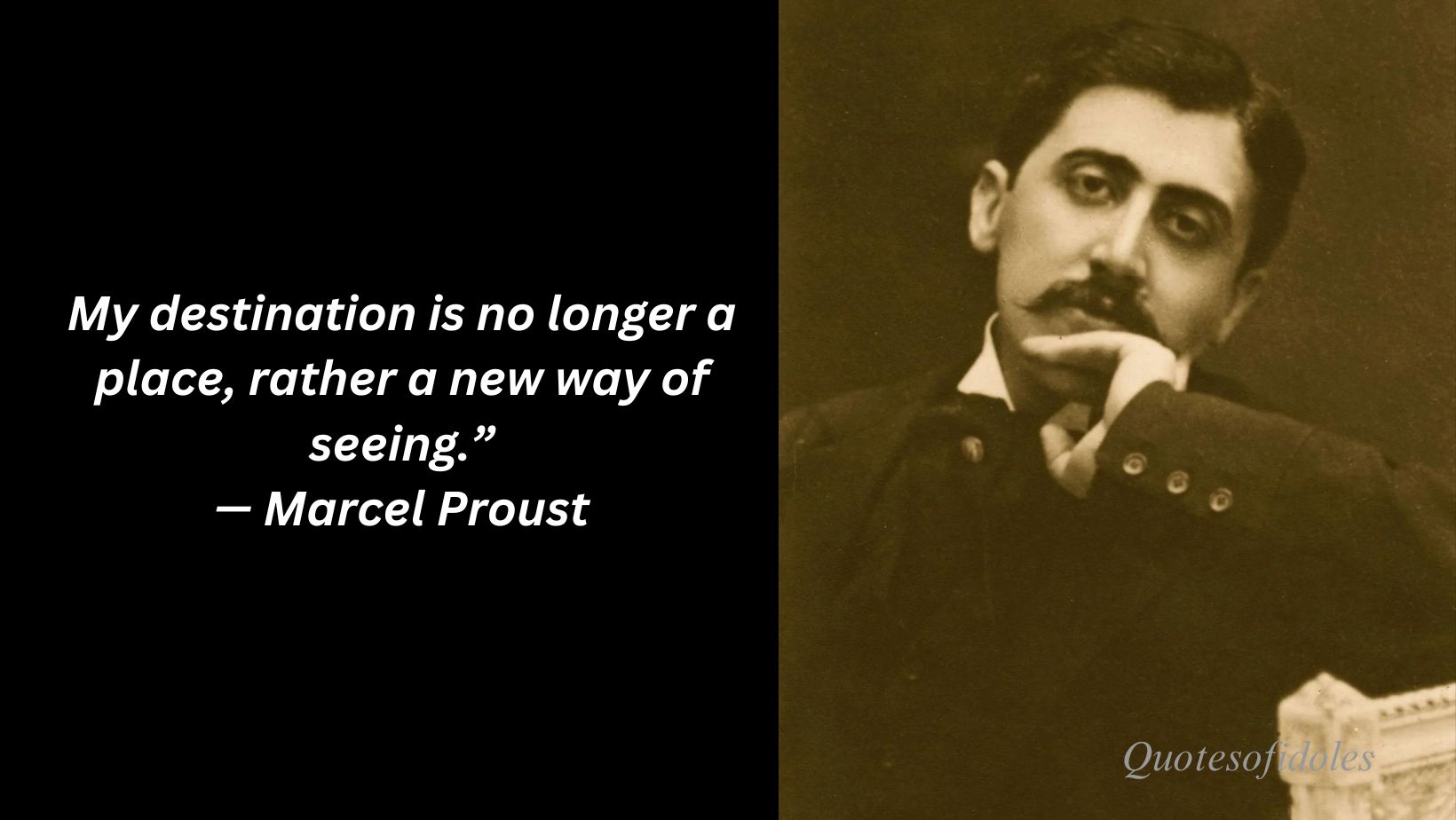
Valentin Louis Georges Eugène Marcel Proust was a French novelist, literary critic, and essayist who wrote the monumental novel À la recherche du temps perdu which was published in seven volumes between 1913 and 1927.
Marcel Proust Quotes
1. “The real voyage of discovery consists not in seeking new landscapes, but in having new eyes.”
— Marcel Proust
2. “My destination is no longer a place, rather a new way of seeing.”
— Marcel Proust
3. “Let us be grateful to people who make us happy, they are the charming gardeners who make our souls blossom.”
— Marcel Proust
4. “Even though our lives wander, our memories remain in one place.”
— Marcel Proust
5. “We don’t receive wisdom; we must discover it for ourselves after a journey that no one can take for us or spare us.”
— Marcel Proust
6. “When you work to please others you can’t succeed, but the things you do to satisfy yourself stand a chance of catching someone’s interest.”
— Marcel Proust
7. “Remembrance of things past is not necessarily the remembrance of things as they were.”
— Marcel Proust
8. “We are healed from suffering only by experiencing it to the full.”
— Marcel Proust
9. “Always try to keep a patch of sky above your life.”
— Marcel Proust
10. “The only true voyage would be not to travel through a hundred different lands, but to see the same land through a hundred different pairs of eyes.”
— Marcel Proust
11. “Do not wait for life. Do not long for it. Be aware, always and at every moment, that the miracle is in the here and now.”
— Marcel Proust
12. “Every reader finds himself. The writer’s work is merely a kind of optical instrument that makes it possible for the reader to discern what, without this book, he would perhaps never have seen in himself.”
— Marcel Proust
13. “Happiness is beneficial for the body, but it is grief that develops the powers of the mind.”
— Marcel Proust
14. “If a little dreaming is dangerous, the cure for it is not to dream less but to dream more, to dream all the time.”
— Marcel Proust
15. “Love is a striking example of how little reality means to us.”
— Marcel Proust
16. “Reading is that fruitful miracle of a communication in the midst of solitude.”
— Marcel Proust
17. “When we have passed a certain age, the soul of the child we were and the souls of the dead from whom we have sprung come to lavish on us their riches and their spells.”
— Marcel Proust
18. “When I am not too sad to listen, music is my consolation.”
— Marcel Proust
19. “There are perhaps no days of our childhood we lived so fully as those we spent with a favorite book.”
— Marcel Proust
20. “Memory nourishes the heart, and grief abates.”
— Marcel Proust
21. “We do not succeed in changing things according to our desire, but gradually our desire changes.”
— Marcel Proust
22. “Often it is just lack of imagination that keeps a man from suffering very much.”
— Marcel Proust
23. “We must never be afraid to go too far, for truth lies beyond.”
— Marcel Proust
24. “The heart does not lie.”
— Marcel Proust
25. “We do not receive wisdom, we must discover it for ourselves, after a journey through the wilderness which no one else can make for us, which no one can spare us, for our wisdom is the point of view from which we come at last to regard the world.”
— Marcel Proust
26. “Like many intellectuals, he was incapable of saying a simple thing in a simple way.”
— Marcel Proust
27. “The creation of the world did not occur at the beginning of time, it occurs every day.”
— Marcel Proust
28. “No man is a complete mystery except to himself.”
— Marcel Proust
29. “Love is a reciprocal torture.”
— Marcel Proust
30. “It has been said that beauty is a promise of happiness. Conversely, the possibility of pleasure can be a beginning of beauty.”
— Marcel Proust
31. “We are able to find everything in our memory, which is like a dispensary or chemical laboratory in which chance steers our hand sometimes to a soothing drug and sometimes to a dangerous poison.”
— Marcel Proust
32. “What we have not had to decipher, to elucidate by our own efforts, what was clear before we looked at it, is not ours. From ourselves comes only that which we drag forth from the obscurity which lies within us, that which to others is unknown.”
— Marcel Proust
33. “It is always during a passing state of mind that we make lasting resolutions.”
— Marcel Proust
34. “It comes so soon, the moment when there is nothing left to wait for.”
— Marcel Proust
35. “A change in the weather is sufficient to recreate the world and ourselves.”
— Marcel Proust
36. “A language which we do not know is a fortress sealed.”
— Marcel Proust
37. “The fixity of a habit is generally in direct proportion to its absurdity.”
— Marcel Proust
38. “The only thing that does not change is that at any and every time it appears that there have been great changes.”
— Marcel Proust
39. “It is always thus, impelled by a state of mind which is destined not to last, we make our irrevocable decisions.”
— Marcel Proust
40. “Now are the woods all black, But still the sky is blue.”
— Marcel Proust
41. “Perhaps the immobility of the things that surround us is forced upon them by our conviction that they are themselves, and not anything else, and by the immobility of our conceptions of them.”
— Marcel Proust
42. “Habit is a second nature which prevents us from knowing the first, of which it has neither the cruelties nor the enchantments.”
— Marcel Proust
43. “Even from the simplest, the most realistic point of view, the countries which we long for occupy, at any given moment, a far larger place in our actual life than the country in which we happen to be.”
— Marcel Proust
44. “We may have revolved every possible idea in our minds, and yet the truth has never occurred to us, and it is from without, when we are least expecting it, that it gives us its cruel stab and wounds us forever.”
— Marcel Proust
45. “We think and name in one world, we live and feel in another.”
— Marcel Proust
46. “Human altruism which is not egoism, is sterile.”
— Marcel Proust
47. “Laissons les jolies femmes aux hommes sans imagination. Leave the pretty women for the men without imagination.”
— Marcel Proust
48. “Griefs, at the moment when they change into ideas, lose some of their power to injure our heart.”
— Marcel Proust
49. “Discovery consists not in seeking new lands, but in seeing with new eyes.”
— Marcel Proust
50. “At the heart of our friendly or purely social relations, there lurks a hostility momentarily cured but recurring by fits and starts.”
— Marcel Proust
51. “If there is one thing more difficult than submitting oneself to a regime it is refraining from imposing it on other people.”
— Marcel Proust
52. “The time at our disposal each day is elastic; the passions we feel dilate it, those that inspire us shrink it, and habit fills it.”
— Marcel Proust
53. “The highest praise of God consists in the denial of him by the atheist who finds creation so perfect that it can dispense with a creator.”
— Marcel Proust
54. “But sometimes illumination comes to our rescue at the very moment when all seems lost; we have knocked at every door and they open on nothing until, at last, we stumble unconsciously against the only one through which we can enter the kingdom we have sought in vain a hundred years – and it opens.”
— Marcel Proust
55. “After a certain age, the more one becomes oneself, the more obvious one’s family traits become.”
— Marcel Proust
56. “People do not die for us immediately, but remain bathed in a sort of aura of life which bears no relation to true immortality but through which they continue to occupy our thoughts in the same way as when they were alive. It is as though they were traveling abroad.”
— Marcel Proust
57. “A little insomnia is not without its value in making us appreciate sleep, in throwing a ray of light upon that darkness.”
— Marcel Proust
58. “The particulars of life do not matter to the artist; they merely provide him with the opportunity to lay bare his genius.”
— Marcel Proust
59. “We ought at least, from prudence, never to speak of ourselves, because that is a subject on which we may be sure that other people’s views are never in accordance with our own.”
— Marcel Proust
60. “It is our imagination that is responsible for love, not the other person.”
— Marcel Proust
61. “The stellar universe is not so difficult to understand as the real actions of other people, especially of the people with whom we are in love.”
— Marcel Proust
62. “Our memory is like a shop in the window of which is exposed now one, now another photograph of the same person. And as a rule the most recent exhibit remains for some time the only one to be seen.”
— Marcel Proust
63. “When from a long distant past nothing subsists after the things are broken and scattered, the smell and taste of things remain.”
— Marcel Proust
64. “To the pure all things are pure!”
— Marcel Proust
65. “For each illness that doctors cure with medicine, they provoke ten in healthy people by inoculating them with the virus that is a thousand times more powerful than any microbe: the idea that one is ill.”
— Marcel Proust
66. “People wish to learn to swim and at the same time to keep one foot on the ground.”
— Marcel Proust
67. “We feel in one world, we think and name in another. Between the two we can set up a system of references, but we cannot fill in the gap.”
— Marcel Proust
68. “All the mind’s activity is easy if it is not subjected to reality.”
— Marcel Proust
69. “May you always see a blue sky overhead, my young friend; and then, even when the time comes, as it has come for me now, when the woods are black, when night is fast falling, you will be able to console yourself, as I do, by looking up at the sky.”
— Marcel Proust
70. “Time passes, and little by little everything that we have spoken in falsehood becomes true.”
— Marcel Proust
71. “There is not a woman in the world the possession of whom is as precious as that of the truths which she reveals to us by causing us to suffer.”
— Marcel Proust
72. “People who are not in love fail to understand how an intelligent man can suffer because of a very ordinary woman. This is like being surprised that anyone should be stricken with cholera because of a creature so insignificant as the common bacillus.”
— Marcel Proust
73. “For every sin there is forgiveness, and especially for the sins of youth.”
— Marcel Proust
74. “One cannot change, that is to say become a different person, while continuing to acquiesce to the feelings of the person one has ceased to be.”
— Marcel Proust
75. “There is no idea that does not carry in itself a possible refutation, no word that does not imply its opposite.”
— Marcel Proust
76. “The sight of the little madeleine had recalled nothing to my mind before I tasted it…”
— Marcel Proust
77. “Indeed, among the lesser auxiliaries to success in love, an absence, the declining of an invitation to dinner, an unintentional, unconscious harshness are of more service than all the cosmetics and fine clothes in the world.”
— Marcel Proust
78. “The moments of the past do not remain still; they retain in our memory the motion which drew them towards the future, towards a future which has itself become the past, and draw us on in their train.”
— Marcel Proust
79. “If we are to make reality endurable, we must all nourish a fantasy or two.”
— Marcel Proust
80. “An hour is not merely an hour, it is a vase full of scents and sounds and projects and climates.”
— Marcel Proust
81. “Desire makes everything blossom; possession makes everything wither and fade.”
— Marcel Proust
82. “There can be no peace of mind in love, since the advantage one has secured is never anything but a fresh starting-point for future desires.”
— Marcel Proust
83. “The inertia of the mind urges it to slide down the easy slope of imagination, rather than to climb the steep slope of introspection.”
— Marcel Proust
84. “I have a horror of sunsets; they’re so romantic, so operatic.”
— Marcel Proust
85. “Instead of seeking new landscapes, develop new eyes.”
— Marcel Proust
86. “The bonds that unite another person to our self exist only in our mind.”
— Marcel Proust
87. “Let us leave pretty women to men devoid of imagination.”
— Marcel Proust
88. “If only for the sake of elegance, I try to remain morally pure.”
— Marcel Proust
89. “Love is an incurable malady like those pathetic states in which rheumatism affords the sufferer a brief respite only to be replaced by epileptiform headaches.”
— Marcel Proust
90. “Illness is the doctor to whom we pay most heed; to kindness, to knowledge, we make promise only; pain we obey.”
— Marcel Proust
91. “There are optical illusions in time as well as space.”
— Marcel Proust
92. “Just as those who practice the same profession recognize each other instinctively, so do those who practice the same vice.”
— Marcel Proust
93. “I had come in time to learn that it was a mistake to smile a friendly smile when somebody made a fool of me.”
— Marcel Proust
94. “Our words are, as a general rule, filled by the people to whom we address them with a meaning which those people derive from their own substance, a meaning widely different from that which we had put into the same words when we uttered them.”
— Marcel Proust
95. “We shall see later on that the diversity of the forms of death that circulate invisibly is the cause of the peculiar unexpectedness of obituary notices in the newspapers.”
— Marcel Proust
96. “We have such numerous interests in our lives that it is not uncommon, on a single occasion, for the foundations of a happiness that does not yet exist to be laid down alongside the intensification of a grief from which we are still suffering.”
— Marcel Proust
97. “When I went to Venice I found that my dream had become-incredibly, but quite simply-my address.”
— Marcel Proust
98. “Time, which changes people, does not alter the image we have retained of them.”
— Marcel Proust
99. “The stellar universe is not so difficult of comprehension as the real actions of other people.”
— Marcel Proust
100. “When two people part it is the one who is not in love who makes the tender speeches.”
— Marcel Proust
101. “A cathedral, a wave of a storm, a dancer’s leap, never turn out to be as high as we had hoped.”
— Marcel Proust
102. “Truth is a point of view about things.”
— Marcel Proust
103. “Love is not vain because it is frustrated, but because it is fulfilled. The people we love turn to ashes when we posess them.”
— Marcel Proust
104. “Things don’t change, but by and by our wishes change.”
— Marcel Proust
105. “Conversation, which is friendship’s mode of expression, is a superficial digression which gives us nothing worth acquiring. We may talk for a lifetime without doing more than indefinitely repeat the vacuity of a minute.”
— Marcel Proust
106. “A powerful idea communicates some of its strength to him who challenges it.”
— Marcel Proust
107. “To have a kind heart is everything.”
— Marcel Proust
108. “Less disappointing than life, great works of art do not begin by giving us all their best.”
— Marcel Proust
109. “Nature hardly seems capable of giving us any but quite short illnesses. But medicine has annexed to itself the art of prolonging them.”
— Marcel Proust
110. “La possession de ce qu’on aime est une joie plus grande encore que l’amour. Possessing what one loves is an even greater joy than love itself.”
— Marcel Proust
111. “Happiness serves hardly any other purpose than to make unhappiness possible.”
— Marcel Proust
112. “In love, happiness is an abnormal state.”
— Marcel Proust
113. “Existence is of little interest save on days when the dust of realities is mingled with magic sand.”
— Marcel Proust
114. “My mother had to abandon her quest, but managed to extract from the restriction itself a further delicate thought, like good poets whom the tyranny of rhyme forces into the discovery of their finest lines.”
— Marcel Proust
115. “I should have been happy: I wasn’t.”
— Marcel Proust
116. “The truth is that every morning war is declared afresh. And the men who wish to continue it are as guilty as the men who began it, more guilty perhaps, for the latter perhaps did not foresee all its horrors.”
— Marcel Proust
117. “En cuanto somos desdichados, nos volvemos morales.”
— Marcel Proust
118. “The features of our face are hardly more than gestures which force of habit made permanent. Nature, like the destruction of Pompeii, like the metamorphosis of a nymph into a tree, has arrested us in an accustomed movement.”
— Marcel Proust
119. “Our worst fears, like our greatest hopes, are not outside our powers, and we can come in the end to triumph over the former and to achieve the latter.”
— Marcel Proust
120. “A work should convey its entire meaning by itself, imposing it on the spectator even before he knows what the subject is.”
— Marcel Proust
121. “We were resigned to suffering, thinking that we loved outside ourselves, and we perceive that our love is a function of our sorrow, that our love perhaps is our sorrow…”
— Marcel Proust
122. “The duty and the task of a writer are those of an interpreter.”
— Marcel Proust
123. “Quartering the topmost branches of one of the tall trees, an invisible bird was striving to make the day seem shorter, exploring with a long-drawn note the solitude that pressed it on every side, but it received at once so unanimous an answer, so powerful a repercussion of silence and of immobility, that one felt it had arrested for all eternity the moment which it had been trying to make pass more quickly.”
— Marcel Proust
124. “A doctor who doesn’t say too many foolish things is a patient half-cured.”
— Marcel Proust
125. “Unkindness is inspired by hatred, anger fuels it into action in which there is no great joy; it would take sadism to turn it into something pleasurable; unkind people imagine themselves to be inflicting pain on someone equally unkind.”
— Marcel Proust
126. “For a man cannot change, that is to say become another person, while he continues to obey the dictates of the self which he has ceased to be.”
— Marcel Proust
127. “Only imagination and belief can differentiate from the rest certain objects, certain people, and can create an atmosphere.”
— Marcel Proust
128. “Our shadows, now parallel, now close together and joined, traced an exquisite pattern at our feet.”
— Marcel Proust
129. “We can only be faithful to what we remember, and we remember only what we have known.”
— Marcel Proust
130. “The social leaders who refuse to allow politics into society are as foreseeing as the soldiers who refuse to allow politics to permeate the army. Society is like the sexual appetite; one does not know at what forms of perversion it may not arrive, once we have allowed our choice to be dictated by aesthetic considerations.”
— Marcel Proust
131. “He imagined himself lying there, unable to sleep, thinking of his mother, separated from her by the unresponsive blankets tucked too tightly round him, feeling the ceaseless thumping of his heart in the silence of the night, the irrevocability of absence, the rigid stillness of repose, the agony of solitude and sleeplessness. If the room was a prison, the bed was a tomb.”
— Marcel Proust
132. “Perhaps she would not have thought of wickedness as a state so rare, so abnormal, so exotic, one which it was so refreshing to visit, had she been able to distinguish in herself, as in all her fellow-men and women, that indifference to the sufferings which they cause which, whatever names else be given it, is the one true, terrible and lasting form of cruelty.”
— Marcel Proust
133. “There’s nothing like desire to prevent the things one says from having any resemblance to the things in one’s mind.”
— Marcel Proust
134. “I spent many a charming evening talking and playing with Albertine, but none so sweet as when I was watching her sleep.”
— Marcel Proust
135. “Desire makes everything blossom.”
— Marcel Proust
136. “I feel infinite sadness at seeing how few people are genuinely kind.”
— Marcel Proust
137. “A ‘real’ person, profoundly as we may sympathise with him, is in a great measure perceptible only through our senses, that is to say, he remains opaque, offers a dead weight which our sensibilities have not the strength to lift.”
— Marcel Proust
138. “No doubt very few people understand the purely subjective nature of the phenomenon that we call love, or how it creates, so to speak, a supplementary person, distinct from the person whom the world knows by the same name, a person most of whose constituent elements are derived from ourselves.”
— Marcel Proust
139. “Depth of character, or a melancholy expression on a woman’s face would freeze his senses, which would, however, immediately melt at the sight of healthy, abundant, rosy human flesh.”
— Marcel Proust
140. “All the great writers are like that: the beauty of their sentences, like the beauty of a woman one has not yet met, is unforeseeable…”
— Marcel Proust
141. “There is, following an ample meal, a sort of pause in time, filled with a gentle slackening of thought and energy, when to sit doing nothing gives us a sense of life’s richness and a feeling that the least effort would be intolerable. The melancholy we took with us to table has disappeared and, if we think of it at all it is only to smile, as at some black mood now past, its cause having gone. And with the melancholy, all scruple, all remorse departs from us.”
— Marcel Proust
142. “How else learn the real, if not by inventing what might lie outside it?”
— Marcel Proust
143. “Anything we have not had to decipher, to bring to light by our own effort, anything which was already clearly visible, is not our own.”
— Marcel Proust
144. “The paradoxes of today are the prejudices of tomorrow, since the most benighted and the most deplorable prejudices have had their moment of novelty when fashion lent them its fragile grace.”
— Marcel Proust
145. “Perfume is that last and best reserve of the past, the one which when all out tears have run dry, can make us cry again!”
— Marcel Proust
146. “We believe we can change things according to our wishes because that’s the only happy solution we can see. We don’t think of what usually happens and what is also a happy solution; things don’t change, but by and by our wishes change.”
— Marcel Proust
147. “Like a kaleidoscope which is every now and then given a turn, society arranges successively in different orders elements which one would have supposed immutable, and composes a new pattern.”
— Marcel Proust
148. “We love only what we do not wholly possess.”
— Marcel Proust
149. “Photography is the product of complete alienation.”
— Marcel Proust
150. “Love is space and time made perceptible to the heart.”
— Marcel Proust
151. “Beautiful books are always written in a sort of foreign language.”
— Marcel Proust
152. “In reality, in love there is a permanent suffering which joy neutralizes, renders virtual delays, but which can at any moment become what it would have become long earlier if one had not obtained what one wanted – atrocious.”
— Marcel Proust
153. “As long as men are free to ask what they must, free to say what they think, free to think what they will, freedom can never be lost and science can never regress.”
— Marcel Proust
154. “Dear Friend: I have nearly died three times since morning.”
— Marcel Proust
155. “Even in the most insignificant details of our daily life, none of us can be said to constitute a material whole, which is identical for everyone, and need only be turned up like a page in an account-book or the record of a will; our social personality is created by the thoughts of other people.”
— Marcel Proust
156. “Thanks to art, instead of seeing one world, our own, we see it multiplied and as many original artists as there are, so many worlds are at our disposal.”
— Marcel Proust
157. “We dream much of a paradise, or rather of a number of successive paradises, but each of them is, long before we die, a paradise lost, in which we should feel ourselves lost too.”
— Marcel Proust
158. “We are all of us obliged, if we are to make reality endurable, to nurse a few little follies in ourselves.”
— Marcel Proust
159. “The facts of life do not penetrate to the sphere in which our beliefs are cherished; they did not engender those beliefs, and they are powerless to destroy them.”
— Marcel Proust
160. “I have every useless thing in the world in my house there. The only thing wanting is the necessary thing, a great patch of open sky like this. Always try to keep a patch of sky above your life, little boy,” he added, turning to me. “You have a soul in you of rare quality, an artist’s nature; never let it starve for lack of what it needs.”
— Marcel Proust
161. “Like a blood-red sky that warns the passerby, “There is a fire over there,” certain blazing looks often reveal passions that they serve merely to reflect. They are flames in the mirror.”
— Marcel Proust
162. “Les vrais paradis sont les paradis qu’on a perdus.”
— Marcel Proust
163. “The sea thus enchants us like music, which, unlike language, never bears the traces of things, never tells us anything about human beings, but imitates the stirrings of the soul.”
— Marcel Proust
164. “No sooner had the warm liquid mixed with the crumbs touched my palate than a shudder ran through me and I stopped, intent upon the extraordinary thing that was happening to me.”
— Marcel Proust
165. “We are not provided with wisdom, we must discover it for ourselves, after a journey through the wilderness which no one else can take for us, an effort which no one can spare us.”
— Marcel Proust
166. “We are at times too ready to believe that the present is the only possible state of things.”
— Marcel Proust
167. “The great quality of true art is that it rediscovers, grasps and reveals to us that reality far from where we live, from which we get farther and farther away as the conventional knowledge we substitute for it becomes thicker and more impermeable.”
— Marcel Proust
168. “In a separation it is the one who is not really in love who says the more tender things.”
— Marcel Proust
169. “In reality, every reader, while he is reading, is the reader of his own self. The writer’s work is merely a kind of optical instrument, which he offers to the reader to permit him to discern what, without the book, he would perhaps never have seen in himself. The reader’s recognition in his own self of what the book says is the proof of its truth.”
— Marcel Proust
170. “We are ordinarily so indifferent to people that when we have invested one of them with the possibility of giving us joy, or suffering, it seems as if he must belong to some other universe, he is imbued with poetry.”
— Marcel Proust
171. “All our final decisions are made in a state of mind that is not going to last.”
— Marcel Proust
172. “Like everybody who is not in love, he thought one chose the person to be loved after endless deliberations and on the basis of particular qualities or advantages.”
— Marcel Proust
173. “Habit is, of all the plants of human growth, the one that has the least need of nutritious soil in order to live, and is the first to appear on the most seemingly barren rock.”
— Marcel Proust
174. “How paradoxical it is to search reality for the pictures that are stored in one’s memory.”
— Marcel Proust
175. “Ambition is more intoxicating than fame; desire makes all things blossom, possession wilts them; it is better to dream your life than to live it, even if living it means dreaming it, though both less mysteriously and less vividly, in a murky and sluggish dream, like the straggling dream in the feeble awareness of ruminant creatures.”
— Marcel Proust
176. “That is why the better part of our memories exists outside us, in a blatter of rain, in the smell of an unaired room or of the first crackling brushwood fire in a cold grate: wherever, in short, we happen upon what our mind, having no use for it, had rejected, the last treasure that the past has in store, the richest, that which, when all our flow of tears seems to have dried at the source, can make us weep again.”
— Marcel Proust
177. “In reality, every reader is, while reading, the reader of his own self.”
— Marcel Proust
178. “Death is in truth an illness from which we recover.”
— Marcel Proust
179. “Each reader reads only what is already within himself. The book is only a sort of optical instrument which the writer offers to the reader to enable the latter to discover in himself what he would not have found but for the aid of the book.”
— Marcel Proust
180. “That translucent alabaster of our memories.”
— Marcel Proust
181. “The best vaccine against anger is to watch others in its throes.”
— Marcel Proust
182. “I felt myself still reliving a past which was no longer anything more than the history of another person;.”
— Marcel Proust
183. “Your soul is a dark forest. But the trees are of a particular species, they are genealogical trees.”
— Marcel Proust
184. “There is no man, however wise, who has not at some period of his youth said things, or lived in a way the consciousness of which is so unpleasant to him in later life that he would gladly, if he could, expunge it from his memory.”
— Marcel Proust
185. “Only by art can we get outside ourselves, instead of seeing only one world, our own, we see it under multiple forms.”
— Marcel Proust
186. “Everybody calls “clear” those ideas which have the same degree of confusion as his own.”
— Marcel Proust
187. “It is a mistake to speak of a bad choice in love, since, as soon as a choice exists, it can only be bad.”
— Marcel Proust
188. “Le bonheur est dans l’amour un e tat anormal. In love, happiness is abnormal.”
— Marcel Proust
189. “We pack the physical outline of the creature we see with all the ideas we have already formed about him, and in the complete picture of him we compose in our minds those ideas have certainly the principal place.”
— Marcel Proust
190. “The anaesthetic effect of custom being destroyed, I would begin to think and to feel very melancholy things. The door-handle of my room, which was different to me from all the other doorhandles in the world, inasmuch as it seemed to open of its own accord and without my having to turn it, so unconscious had its manipulation become; lo and behold, it was now an astral body for Golo. And.”
— Marcel Proust
191. “We construct our lives for one person, and when at length it is ready to receive her that person does not come; presently she is dead to us, and we live on, prisoners within the walls which were intended only for her.”
— Marcel Proust
192. “Neurosis has an absolute genius for malingering. There is no illness which it cannot counterfeit perfectly. If it is capable of deceiving the doctor, how should it fail to deceive the patient.”
— Marcel Proust
193. “To think that I have wasted years of my life, that I have longed for death, that the greatest love that I have ever known has been for a woman who did not please me, who was not in my style!” PLACE-NAMES:.”
— Marcel Proust
194. “I have built, deep in my heart, a chapel filled with you.”
— Marcel Proust
195. “A picture’s beauty does not depend on the things portrayed in it.”
— Marcel Proust
196. “The time which we have at our disposal every day is elastic; the passions that we feel expand it, those that we inspire contract it; and habit fills up what remains.”
— Marcel Proust
197. “The world was not created once and for all time for each of us individually. There are added to it in the course of our life things of which we have never had any suspicion.”
— Marcel Proust
198. “Even his mother, his own mother, had once accused him of being a snob.”
— Marcel Proust
199. “One must never miss an opportunity of quoting things by others which are always more interesting than those one thinks up oneself.”
— Marcel Proust
200. “Sometimes, too, just as Eve was created from a rib of Adam, so a woman would come into existence while I was sleeping, conceived from some strain in the position of my limbs. Formed by the appetite that I was on the point of gratifying, she it was, I imagined, who offered me that gratification. My body, conscious that its own warmth was permeating hers, would strive to become one with her, and I would awake.”
— Marcel Proust

